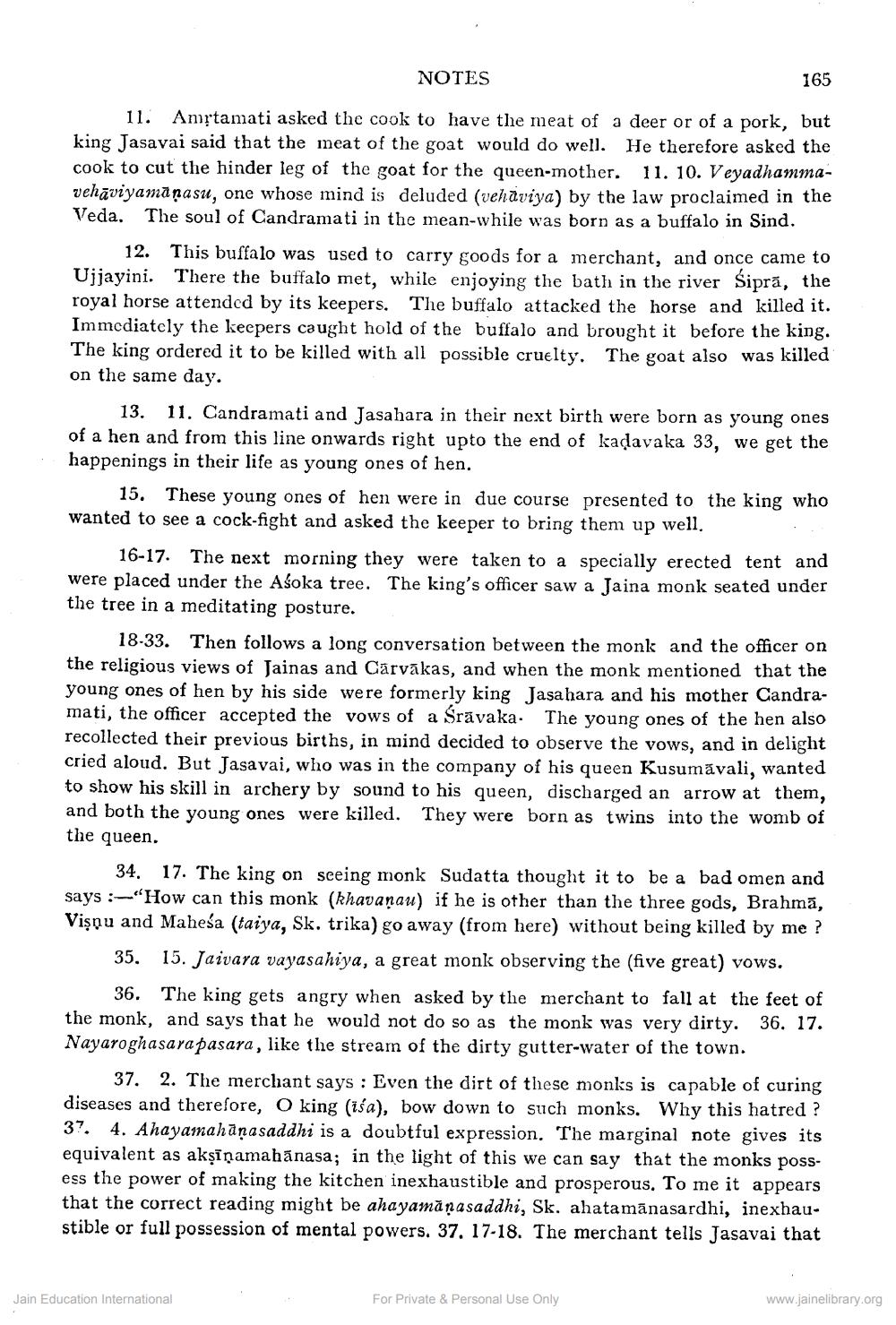________________
NOTES
165
11. Amrtamati asked the cook to have the meat of a deer or of a pork, but king Jasavai said that the meat of the goat would do well. He therefore asked the cook to cut the hinder leg of the goat for the queen-mother. 11. 10. Veyadhammavehāviyamāņasu, one whose mind is deluded (vehāviya) by the law proclaimed in the Veda. The soul of Candramati in the mean-while was born as a buffalo in Sind.
12. This buffalo was used to carry goods for a merchant, and once came to Ujjayini. There the buffalo met, while enjoying the bath in the river Siprā, the royal horse attended by its keepers. The buffalo attacked the horse and killed it. Immediately the keepers caught hold of the buffalo and brought it before the king. The king ordered it to be killed with all possible cruelty. The goat also was killed on the same day.
13. 11. Candramati and Jasahara in their next birth were born as young ones of a hen and from this line onwards right upto the end of kadavaka 33, we get the happenings in their life as young ones of hen.
15. These young ones of hen were in due course presented to the king who wanted to see a cock-fight and asked the keeper to bring them up well.
16-17. The next morning they were taken to a specially erected tent and were placed under the Asoka tree. The king's officer saw a Jaina monk seated under the tree in a meditating posture.
18-33. Then follows a long conversation between the monk and the officer on the religious views of Jainas and Cārvākas, and when the monk mentioned that the young ones of hen by his side were formerly king Jasahara and his mother Candramati, the officer accepted the vows of a Srāvaka. The young ones of the hen also recollected their previous births, in mind decided to observe the vows, and in delight cried aloud. But Jasavai, who was in the company of his queen Kusumavali, wanted to show his skill in archery by sound to his queen, discharged an arrow at them, and both the young ones were killed. They were born as twins into the womb of the queen.
34. 17. The king on seeing monk Sudatta thought it to be a bad omen and says "How can this monk (khavanau) if he is other than the three gods, Brahmā, Vişnu and Mahesa (taiya, Sk. trika) go away (from here) without being killed by me ?
35. 15. Jaivara vayasahiya, a great monk observing the (five great) vows.
36. The king gets angry when asked by the merchant to fall at the feet of the monk, and says that he would not do so as the monk was very dirty. 36. 17. Nayaroghasara pasara, like the stream of the dirty gutter-water of the town.
37. 2. The merchant says : Even the dirt of these monks is capable of curing diseases and therefore, o king (iša), bow down to such monks. Why this hatred ? 37. 4. Ahayamahānasaddhi is a doubtful expression. The marginal note gives its equivalent as akṣīņamahānasa; in the light of this we can say that the monks possess the power of making the kitchen inexhaustible and prosperous. To me it appears that the correct reading might be ahayamănasaddhi, Sk. ahatamānasardhi, inexhaustible or full possession of mental powers. 37, 17-18. The merchant tells Jasavai that
Jain Education International
For Private & Personal Use Only
www.jainelibrary.org




